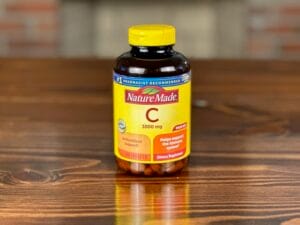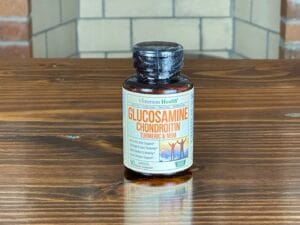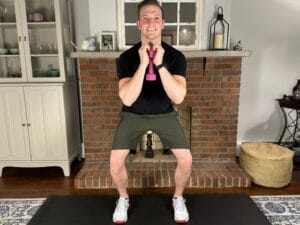Updated on February 5, 2026
Quick Guide: Phase 1 (0-2 weeks) Exercises After Meniscectomy
The best exercises after meniscectomy for the first two weeks are the hamstring stretch, calf stretch with a strap, quad set, straight leg raise, short arc quad, long arc quad, and heel slides. These exercises should be completed twice daily and should not increase your pain or symptoms. This program was created by a Doctor of Physical Therapy who is an Orthopedic Clinical Specialist, make sure to speak to your healthcare provider before initiating a new exercise routine.
1. Hamstring Stretch
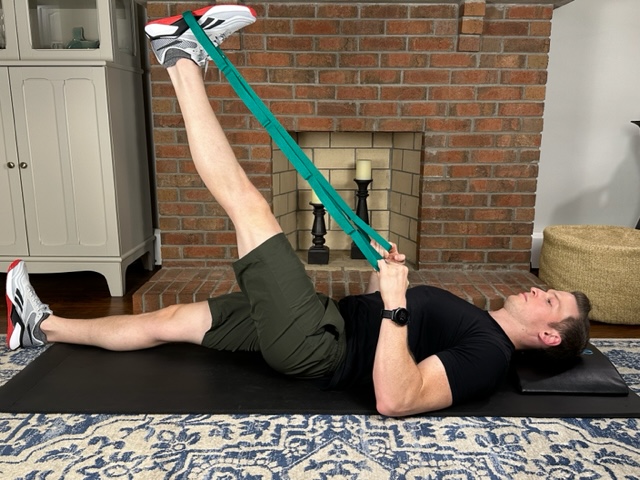
- Stretches the hamstring muscle on the back of your thigh
- Improves flexibility in the muscles behind your knee
- Keep your leg straight and lift off the table with a strap
- Hold this stretch for 20 seconds and repeat 5 times
- Best Stretching Strap in the link below
2. Calf stretch
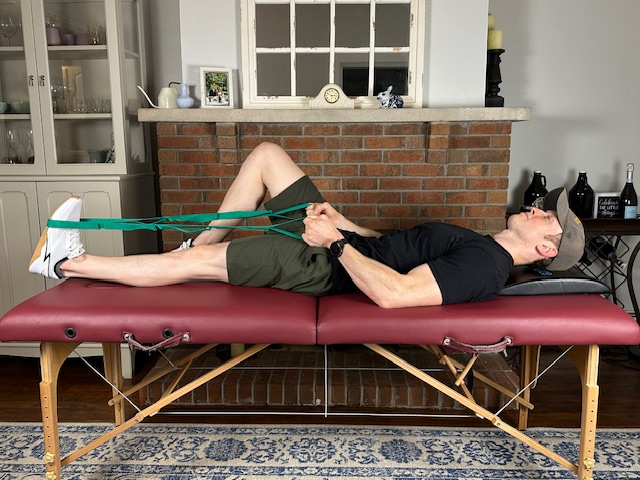
- Stretches the calf muscle on the back of your lower leg
- Important for increasing knee extension and improving flexibility
- Keep your leg straight and pull your toes toward your nose with a strap
- Hold this stretch for 20 seconds and repeat 5 times
- Best Stretching Strap in the link below
3. Quad set

- Activates the quad muscle on the front of your thigh
- Important for restoring strength to your quadricep
- Straighten your leg as much as you can and squeeze your thigh muscle
- Hold this contraction for 3 seconds and repeat 20 times
- Use a small, rolled up towel behind your knee to push in to
4. Straight Leg Raise
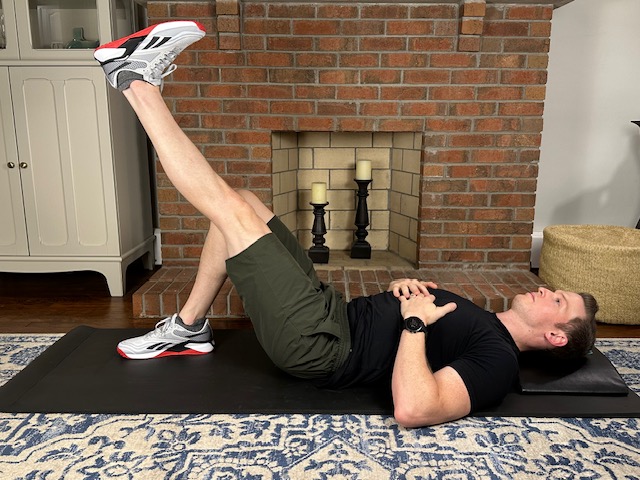
- Strengthens the quad muscle on the front of your thigh
- Reduces pain in your knee by strengthening the quadricep
- Keep your leg straight and lift off the table to the height of your other knee
- Complete 10 repetitions and perform 2 sets
5. Short Arc Quad

- Strengthens the quad muscle on the front of your thigh
- Reduces pain in your knee by strengthening the quadricep
- Keep your knee on the foam roll and kick your heel off the table
- Complete 20 repetitions and perform 2 sets
- Best Foam Roll and Ankle Weights in the links below
6. Long Arc Quad
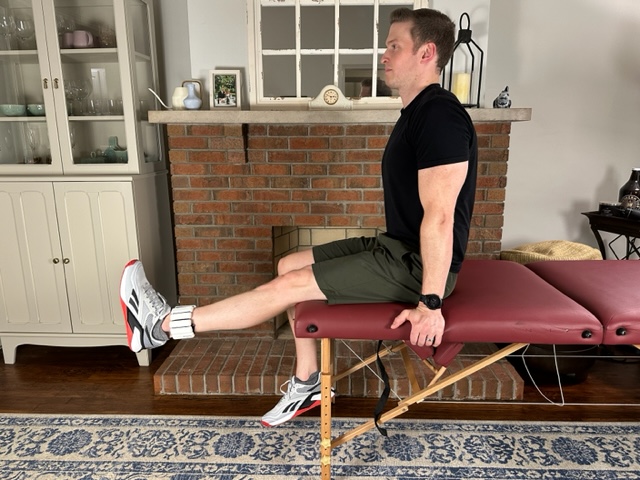
- Strengthens the quad muscle on the front of your thigh
- Reduces knee pain by strengthening the quadricep
- Keep your thigh on the table and kick your foot out until your knee is straight
- Complete 20 repetitions and perform 2 sets
- Best Ankle Weights in the link below
7. Heel Slides
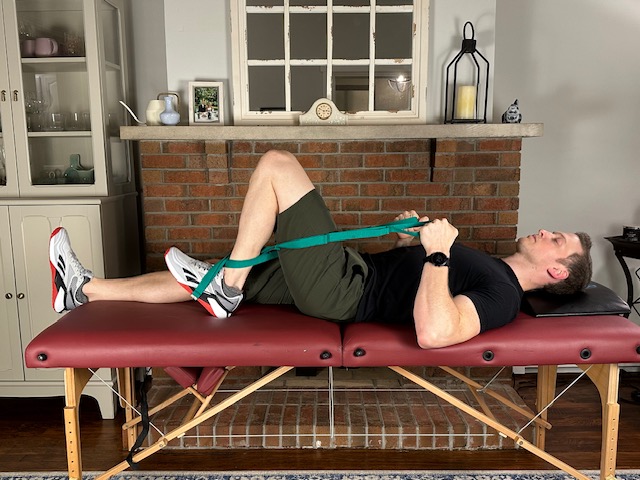
- Stretches the knee joint capsule and quad muscle
- Improves the flexion range of motion and bend of your knee
- Loop a strap around your foot and slide your heel toward your butt
- Hold this stretch for 10 seconds and repeat 10 times
- Best Stretching Strap in the link below
Bonus: Helpful equipment for healing after meniscectomy; Ice Pack and TENS
Quick Guide Part 2: Phase 2 (2-8 weeks) Exercises After Meniscectomy
The best exercises after meniscectomy for weeks two through eight are the calf stretch on a slant board, heel/toe raises, cone step-overs, step-ups, lateral step-ups, and balance on a foam pad. These exercises should be completed daily and should not increase your pain or symptoms. This program was created by a Doctor of Physical Therapy who is an Orthopedic Clinical Specialist, make sure to speak to your healthcare provider before initiating a new exercise routine.
1. Calf stretch on a slant board
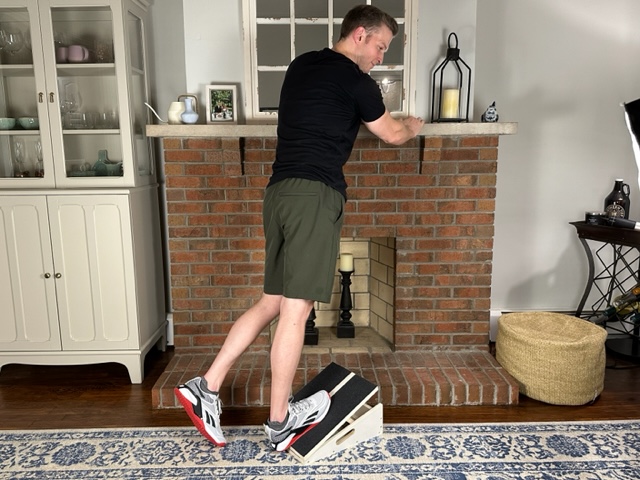
- Stretches the muscle on the back of your lower leg
- Important for getting your knee perfectly straight
- Keep your foot flat on the board and lean forward to feel a stretch
- Hold this stretch for 20 seconds and repeat 5 times
- Best Slant Board for this stretch in the link below
2. Heel raise/Toe raise
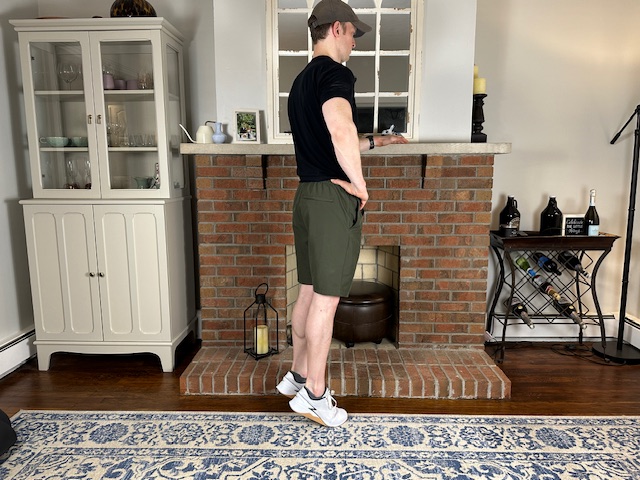
- Strengthens the muscles in your lower leg
- Important for restoring normal walking motion
- Raise up on your toes and then rock back on your heels
- Perform 20 repetitions and complete 2 sets
3. Cone step-over
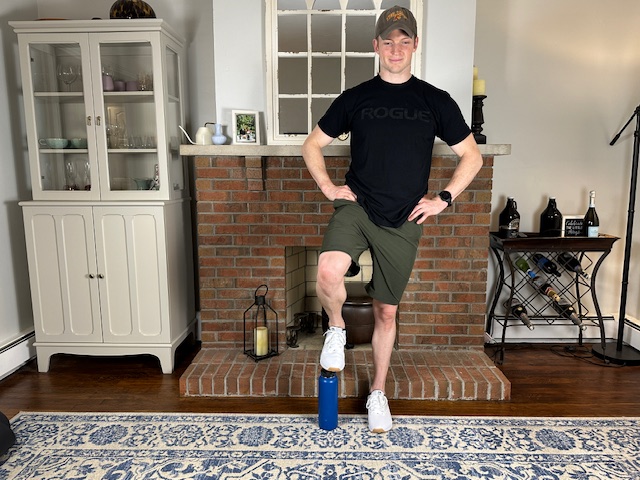
- Improves active flexion range of motion of your knee
- Important for bending your knee and walking
- Start on one side of the cone and step over the top to the other side
- Perform 20 repetitions and complete 1 set
- Best Stackable Cones in the link below
4. Step-ups
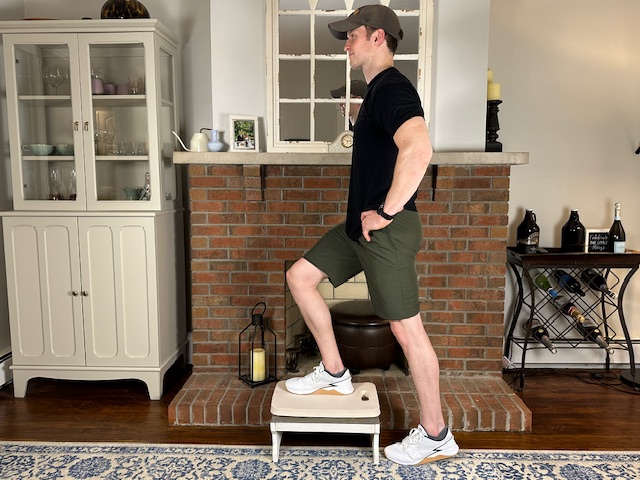
- Strengthens all of the muscles in your leg
- Important for restoring strength to go up and down stairs
- Step up onto the platform and then back down to the start position
- Perform 10 repetitions and complete 2 sets
- Best Adjustable Stepper in the link below
5. Lateral step-ups
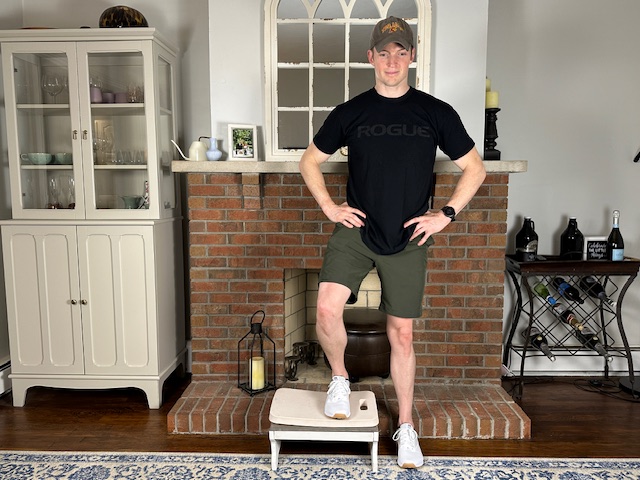
- Strengthens all of the muscles in your leg
- Important for restoring strength to go up and down stairs
- Step sideways onto the stair, then to the other side, and back to the start
- Perform 10 repetitions and complete 2 sets
- Best Adjustable Stepper in the link below
6. Balance on foam
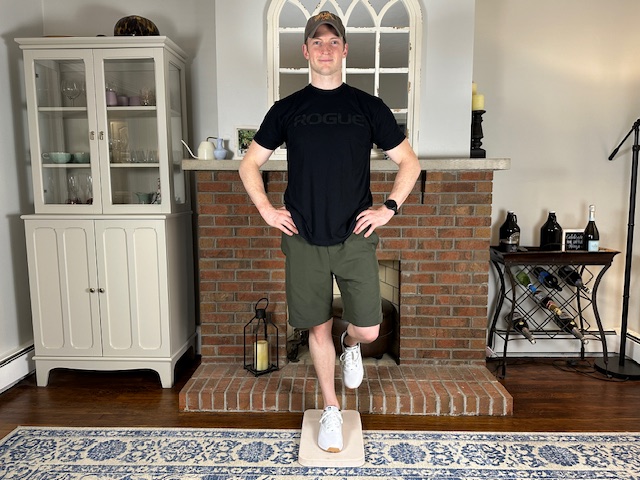
- Improves your balance and proprioception of your knee
- Important for restoring balance and preventing falls
- Stand on one leg and hover your hands above a stable surface
- Hold for 15 seconds and repeat 5 times
- Best Foam Balance Pad in the link below
Bonus: Helpful equipment for completing your meniscectomy exercises
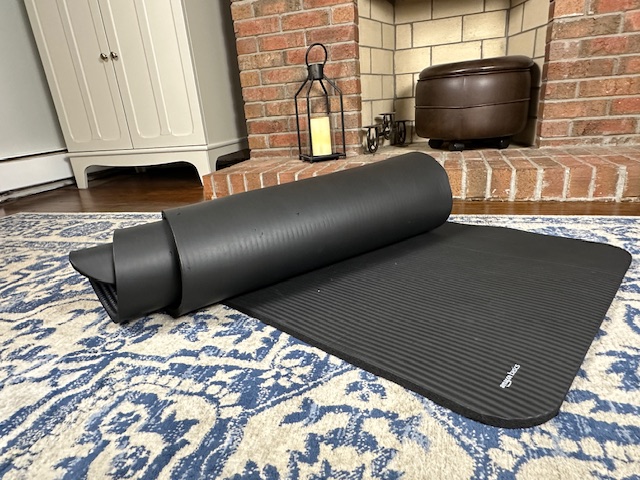
- Thick Yoga Mat provides a soft surface to complete exercises on
- It is lightweight and can be rolled up for easy storage
- You can use it for other stretching and exercise routines as well
- Best Thick Yoga Mat in the link below
Disclaimers and Disclosures: All information in this article is for informational and educational purposes only and should not be taken as individual medical advice. Additionally, this article contains affiliate links, meaning when you make a purchase, we make a small commission at no additional cost to you. For more information, see our full Disclaimers and Disclosures.
Are you looking for the best exercises to do after meniscectomy surgery of your knee?
If you’re looking to expedite your recovery and maximize your functional potential with the best exercises after your meniscectomy surgery, then you’re in the right place! Although this surgery is common, with thousands performed each year, the recovery process can feel slow and painful. A proper physical therapy exercise and stretching routine performed on a daily basis is the most important way to recover after your meniscectomy.
As a physical therapist with over 10 years of experience, I have seen hundreds of patients after meniscus surgery. Because of this, I have created an exercise program specifically designed to address the deficits that are present following the operation. I have included the most important exercises after meniscectomy that I prescribe to my patients, to help them heal and recover faster.
In this article, I will give you an in-depth description of all the exercises you need to be doing after your meniscectomy and how to perform them. Additionally, I will provide recommendations for the best equipment that we use in the clinic with all of our patients to help complete each of these exercises.
I have broken the exercises into two phases. The first phase is the acute post-operative phase for 0-2 weeks, then the second phase is to restore maximum function, which is performed in weeks 2-8. If you’re looking to get started right away, then check out our quick guide to the best exercises after meniscectomy directly above, and then scroll later in the article for the in-depth descriptions of how to perform them.
Phase 1 In-Depth Descriptions: What are the best at home physical therapy exercises after meniscectomy in the first two weeks after surgery?
The best physical therapy exercises after meniscectomy surgery in the first two weeks are the hamstring stretch, calf stretch with a strap, quad set, straight leg raise, short arc quad, long arc quad, and heel slides. These exercises should be completed twice daily starting the day after your meniscus surgery.
1. Hamstring Stretch

How to perform the hamstring stretch with a strap exercise after meniscectomy.
Start by lying on your back with both legs straight and the strap around the middle of your foot. Keep your knee straight and use the strap to pull your leg straight up until you feel a stretch in the back of your leg. Once you feel the stretch, hold it for 20 seconds and then lower back down to the start position. Rest for a second or two and repeat this 5 times.
Professional tip: “Having a slight bend in your knee is ok to start out. But as your body gets used to this stretch, you should work to keep your knee as straight as possible”.
What is the best equipment for the hamstring stretch with a strap exercise?
The Stretch Out Strap is the best option for several reasons. It is 6 feet long and has multiple loops and handles all along its length. This makes it good for people of different sizes and allows you to get the most comfortable grip. It is also very durable and we have had thousands of patients use it in our clinic and most of them end up buying one for their own use at home. The Stretch Out Strap can be found in the link below.
2. Calf Stretch

How to perform the calf stretch with a strap exercise after meniscectomy.
Start by lying on your back with your leg straight and the strap around the ball of your foot. Keep your knee straight and pull your foot and toes back toward you by pulling on the strap. Once you feel the stretch in the back of your leg, hold it for 20 seconds and repeat 5 times.
Professional tip: “If you can’t feel the stretch at first, actively pull your toes toward your nose first, and then give extra pressure by pulling on the strap”.
What is the best equipment for the calf stretch with a strap?
The Stretch Out Strap is also the best option for this stretch as well. It has great utility and can be used for over 20 different stretches that we commonly have patients perform. There is also a version of this strap that is about a foot longer, the Stretch Out Strap XL, and it works well for people taller than 5’10’’. The Stretch Out Strap XL can be found in the link below.
3. Quad Set

How to perform the quad set with a towel roll exercise after meniscectomy.
Start by lying on your back with your knee straight and a small rolled up towel under your ankle. Tighten your thigh muscle and push the back of your knee straight down toward the table. Focus on feeling a squeeze in the muscle on the front of your thigh and hold it for 2-3 seconds. Then relax and repeat this 20 times.
Professional tip: “This exercise is also designed to help you regain full extension range of motion. Because of this, it can be a little uncomfortable when you first start. This is normal as long as the discomfort is tolerable and you should mostly feel it behind your knee”.
What is the best equipment for the quad set with a towel roll?
A rolled-up hand towel that is a couple inches in diameter will work just fine. The purpose of the towel is to prop your ankle up a few inches so your knee isn’t in contact with the table. This is what will allow you to get your knee fully straight again instead of having a little bend in your knee.
4. Straight Leg Raise

How to perform the straight leg raise exercise after meniscectomy.
Start lying on your back with your involved leg straight and your uninvolved leg bent to a 90-degree angle. Tighten the muscle on the front of your thigh, keep your leg straight, and lift it off the table until it is parallel to your other thigh. Pause for a second and then return to the starting position. Repeat this 10 times, take a 30 second break, and perform 2 sets.
Professional tips: “Most of my patients will lift their leg a little too high to start. If you go too far though, you will actually lose tension in the muscle which makes the exercise less effective. Lift your leg just until your knees are the same height and that will do the trick”.
What is the best equipment for the straight leg raise?
It’s nice to have a firm but soft surface to lie on for your exercises. Many of our patients will start their exercises in bed but most people prefer a surface that is a little firmer. A nice thick yoga mat is a good solution to this problem. It can be rolled up for easy storage and can even be thrown in the car and brought on vacation if you prefer rehabbing on the go. The Thick Yoga Mat can be found in the link below.
5. Short Arc Quad

How to perform the short arc quad exercise after meniscectomy.
Start lying on your back with a bolster under your knee. Slowly, kick your heel off the table until your leg is straight but make sure the back of your knee stays in contact with the bolster. Try to tighten your quad muscle at the top position and then return to the start. Repeat this 20 times, take a 30 second break, and perform 2 sets.
Professional tip: “The first time you do this exercise try it without any weight. If it is easy and relatively pain-free then you can try adding a pound to the ankle weight. Slowly keep adding weight over the days and weeks, but it’s better to go a little slower rather than overdoing it”.
What is the best equipment for the short arc quad exercise?
It is important for the ankle weights to fit comfortably and securely around your ankle. Another really nice feature is the ability to adjust the amount of weight that it holds. These ankle weights meet all of these criteria, are highly rated, and are sold in pairs which can give you even more weight to use if you’re feeling extra strong! The Ankle Weights can be found in the link below.
The bolster that your knee is supported on should be firm but comfortable. A diameter of about 6 inches works best, so a foam roller is my favorite piece of equipment for this exercise. It’s also really nice because you can use it for other mobility work you may do such as rolling out your quads, IT band, and hamstrings. I love getting pieces of equipment that can serve a bunch of different purposes and be used over and over again. The Foam Roll can be found in the link below.
6. Long Arc Quad

How to perform the long arc quad exercise after meniscectomy.
Start sitting in a chair or on the side of your bed with your knees bent. Slowly kick your foot all the way out until your leg is straight and the back of your thigh is still on the surface. Try to tighten your quad at the top position for a second and then return to the start position. Repeat this 20 times, take a 30 second break, and perform 2 sets.
Professional tips: “Begin by using a one-pound weight the first time you perform the long arc quads. If the exercise is easy and relatively pain-free then you can add a pound to the ankle weight every few days. Slowly keep progressing to build the strength in your quadriceps”.
What is the best equipment for the long arc quad exercise?
You can use the same ankle weights that you used for the short arc quad exercise above. Since these ankle weights are adjustable, you can quickly switch the weight if you need more or less for this exercise. However, most of the time, I will have my patients use the same amount of weight for both of these exercises. The Ankle Weights can be found in the link below.
7. Heel Slides

How to perform the heel slides with a strap exercise after meniscectomy.
Start lying on your back with the strap around the middle of your foot. Try to relax your leg and slowly pull on the handles of the strap so your knee bends and your heel slides up toward your butt. Keep pulling until you feel just a gentle stretch across your knee. Once you feel the stretch, hold it there for 10 seconds then return to the start position and repeat 10 times.
Professional tip: “I usually tell people this exercise is most people’s least favorite for the first couple of weeks due to the discomfort associated with it. So, if you’re feeling this discomfort then you’re in good company. This is normal, but we want it to be tolerable and the pain should go away very quickly when you’re done with the exercise”.
What is the best equipment for the heel slides with a strap exercise?
The stretch out strap is the best option for several reasons. It is 6 feet long and has multiple loops and handles all along its length, so it is good for people of different sizes and allows you to get the most comfortable grip. It is also very durable and we have had thousands of patients use it in our clinic and most of them end up buying one for their own use at home. The Stretch Out Strap can be found in the link below.
Helpful equipment after meniscectomy: Ice and TENS
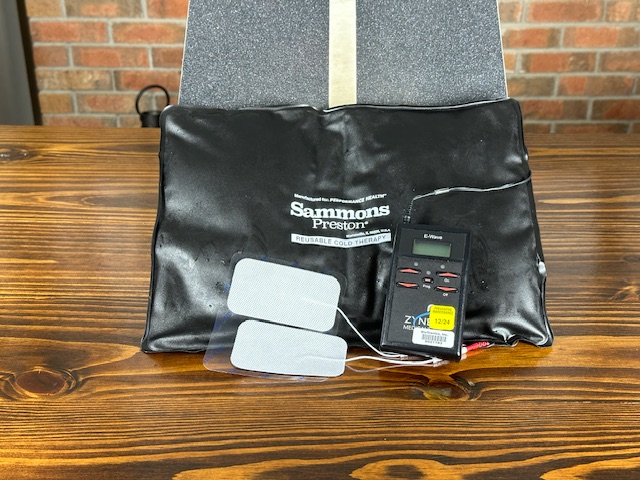
How to use Ice and TENS after a meniscectomy.
I like to have my patients lie on their back with their leg propped up so the knee is above heart level, this will also help with getting rid of the swelling. Then I place the pads of the TENS unit on either side of the knee cap. I then wrap the knee in a pillowcase to place a barrier between the skin and the ice, and then I’ll place one ice pack behind and one on top of the knee so the whole joint is surrounded.
Professional tip: “Turn up the TENS until you feel a comfortable tingling sensation. This isn’t one of those “the stronger the better” scenarios, so only increase the TENS until it is at a very comfortable level for you. Keeping the ice and TENS on for 10-15 minutes at a time seems to be the optimal timeframe for reducing pain and inflammation”.
What is the best ice and TENS after knee meniscectomy surgery?
It’s pretty hard to beat the TENS units we have in the clinic. But considering those units are over $3,000, this portable unit with great reviews for under $50 is an excellent alternative. This unit comes in a travel case, with two channels allowing for 4 electrode placements, and runs on a 9-volt battery. Consider this simple but effective pain relief. The TENS Unit can be found in the link below.
These ice packs are exact replicas of the ones we use in the clinic, and our patients love them! I have had so many patients ask for a recommendation on where they can get the ice packs that we use. They are sick of hard ice packs that don’t conform, or using bags of peas from their freezer that just don’t work as well as they want them to.
These ice packs are large, reusable, and conform to various body parts so you can use them over and over again on any aching joints. I suggest you get a small and a medium so you can wrap your entire knee, front and back. Some people like to get a handful of the ice packs so they can keep one sets in the freezer, nice and cold, while they’re using the other set. The Ice Pack can be found in the link below.
Phase 2 In-Depth Descriptions: What are the best at home physical therapy exercises after meniscectomy in weeks two through eight after surgery?
The best physical therapy exercises after meniscectomy surgery in weeks two through eight are the calf stretch on a slant board, heel/toe raises, cone step-overs, step-ups, lateral step-ups, and balance on a foam pad. These exercises should be completed once daily starting at the two-week mark after your meniscus surgery.
1. Calf Stretch on a Slant Board

How to perform the calf stretch on a slant board exercise after meniscectomy.
Start by placing the slant board in front of your counter or another stable object you can hold on to. Place both feet on the slant bord with your toes facing forward and your knees nice and straight. Stand tall and then gently lean your whole body forward and keep your heels down on the board the entire time. Once you feel the stretch in the back of your legs, hold it there for 20 seconds and repeat 5 times.
Professional tip: “Start with a gentle stretch at a lower incline. Then, as you gain mobility, you can try higher inclines on the slant board”.
What is the best equipment for the calf stretch on a slant board?
My favorite piece of equipment for performing the calf stretch on the slant board is the StrongTek Professional Wooden Slant Board. This is almost exactly like the slant board we have been using in the clinic with our patients for well over a decade now.
It is adjustable with 5 different angles for calf stretches so you can vary it from 15 degrees all the way to 35 degrees. This allows you to start with a gentle stretch and progress the angle as you gain flexibility. Also, it has anti-slip tread on both the surface as well as the bottom so you can safely perform this stretch without the risk of slipping.
Additionally, it’s made of hardwood plywood which makes it more durable than other slant boards, with up to a 450-pound capacity. Finally, it’s 12”x16” so you don’t have to worry if you have big feet or do this stretch with your shoes one, there will be plenty of room for your feet.
The Slant Board can be found in the link below.
2. Heel Raise/Toe Raise

How to perform the heel raise/toe raise exercise after meniscectomy.
Start standing in front of your counter or another stable object you can hold on to. Slowly raise your heels off the ground so you are standing on tip toes, then return to the start position. Then raise your toes off the ground so you are standing on your heels, then return to the start position. Repeat both of these actions 20 times, take a 30 second break, and perform 2 sets.
Professional tip: “It’s ok to gently rock forward when you go on your toes and back when you go on your heels, but try to stay standing nice and tall the whole time without too much forward and backward motion”.
3. Cone Step-over

How to perform the cone step-over exercise after meniscectomy.
Start by placing a cone in front of your counter or other stable surface. Grab on to the counter with your hands and stand on one side of the cone, on one foot. Step directly over top of the cone to the other side and then bring your other leg over to that side as well. Then step back to the original side in the same fashion. This counts as one repetition, perform a total of 20 times.
Professional tip: “Make sure to step right over top of the cone with both feet every time you step. It doesn’t count if you sneak one or both feet around the cone instead of over the top. As you get better and if this exercise is easy, you can stack cones on top of each other so it turns into a higher target”.
What is the best equipment for the cone step-over exercise?
These stackable cones are very similar to what we use in the clinic. They’re about 7 inches tall, which is a good starting height, and then you can stack them on top of each other to increase the height of the target as you gain more mobility. The Therapy Cones can be found in the link below.
4. Step-ups

How to perform the step-up exercise after meniscectomy.
Start by placing a small step perpendicular to your counter or other stable surface. Hold on to the counter with one hand and step up on the platform with your unaffected leg, then bring your affected leg up on the platform. Return back to your start position by stepping backward in the same sequence.
Once you have completed 10 step-ups leading with the unaffected leg, then perform 10 repetitions leading with the affected leg. Take a 30 second break and perform 2 sets with each leg.
Professional tips: “Start with a 4-inch step height when you begin this exercise. Once you can perform all the repetitions without pain and with relative ease, increase the step height by 2 inches. A normal height step is 8 inches, so I have my patients work toward this goal”.
“Also, use your hand on your unaffected side to hold onto the counter. Holding on with this hand will distribute your weight more evenly and take pressure off your injured knee. As you get better and gain confidence, you can try this exercise without holding on”.
What is the best equipment for the step-up exercise?
For this exercise, you will want a stepper that is adjustable and that has good traction. The stepper below is nonslip and allows for variable heights so you can progress as you get strong and feel better. These are the same steppers we use in the clinic, so I know they are durable and work well. The Stepper can be found in the link below.
5. Lateral Step-ups

How to perform the straight leg raise exercise after meniscectomy.
Start by placing a small step perpendicular to your counter or other stable surface. Stand facing the counter and hold on to it with both hands and the stepper to your side. Step up on the stepper with both feet, then step down to the other side of the stepper. Then return back to your start position in the same manner going up and over the stepper with both feet.
Over and back counts as one repetition. Perform 10 repetitions, take a 30 second break, and complete 2 sets.
Professional tip: “Start with a 4-inch step height when you begin this exercise. Once you can perform all the repetitions without pain and with relative ease, increase the step height by 2 inches. A normal height step is 8 inches, so I have my patients work toward this goal”.
What is the best equipment for the lateral step-up exercise?
You can use the same stepper that we used for the step-up exercise. I like to start at the same height and slowly progress over time. This stepper is great because of its versality and the number of exercises you can do on it. We have hundreds of patients do dozens of different exercises on them, so they come in pretty handy. The Stepper can be found in the link below.
6. Balance on Foam

How to perform the balance on foam exercise after meniscectomy.
Start by placing the foam balance pad in front of your counter or other stable surface. Stand on the foam pad facing the counter and hold on to it with both hands. Raise your good foot off the foam pad so you are just standing on your bad leg. Once you feel balance, slowly raise your hands off the counter and hold them there. The goal is to balance on one leg for 15 seconds, and just make small corrections with your hands or other foot if you need to. Once you reach 15 seconds, then repeat on the other side to give your leg a break. Repeat this a total of 4 times on each side.
Professional tip: “Start without the foam pad and just perform this exercise on the floor. Balancing on one leg is often trickier than people expect, especially after a surgery. Once you are able to get through all 4 repetitions without having to hold on to the counter or put your other foot down, then you can try on the foam pad”.
What is the best equipment for the balancing on a foam pad exercise?
The Airex balance pad is what we have used in our clinic for well over a decade now. It was designed specifically for balance exercises and what most studies have been performed on. It is durable as well as reliable and I would consider it the number one brand trusted by physical therapists for balance exercises. A version similar to the Airex Balance Pad can be found in the link below.
Best Exercises After Meniscectomy Surgery Final Thoughts
The pain associated with a meniscus tear is no laughing matter and I have seen firsthand how debilitating this condition can be. The ultimate goal would be to get better without going through surgery. In fact, the majority of people can get better without surgery, but by doing a physical therapy exercise routine for a torn meniscus instead.
However, if you end up needing the surgery, then you now have all the exercises you will need for a very successful outcome. The trick is to be diligent with your exercise routine and perform it consistently every day. In a matter of a few weeks to months, I have faith you will be back to all the activities you love to do, and pain-free!
Make sure to look at our other related articles to get the best exercise guides for:
Frequently Asked Questions About Post-Op Meniscectomy Surgery Exercises
Most patients can begin gentle exercises the day after meniscectomy surgery, unless their surgeon advises otherwise. Early exercises focus on restoring knee motion, activating the quadriceps, and reducing stiffness without stressing the healing tissue.
During the first two weeks after surgery, exercises are typically performed twice per day. From weeks two through eight, most patients transition to once-daily exercise sessions, depending on pain, swelling, and progress.
Mild soreness or temporary swelling is common, especially early in recovery. Exercises should not cause sharp pain or increasing swelling that lasts into the next day. If symptoms worsen, the program may need to be adjusted.
Most people regain normal daily function within 4–8 weeks after a meniscectomy. Higher-level activities such as running, squatting, or sports may take longer depending on strength, swelling, and adherence to rehabilitation.
Yes. A structured exercise program helps restore strength, mobility, and knee stability, which may reduce the risk of ongoing pain, stiffness, or functional limitations after surgery.
Some patients do well with a guided home exercise program, while others benefit from in-person physical therapy for supervision and progression. A physical therapist can help ensure exercises are performed correctly and safely.
Additional Queries Patients Ask About Meniscectomy Exercises
Most patients are allowed to walk immediately after surgery, often without crutches, depending on pain and swelling. Your surgeon’s instructions should always be followed.
These exercises are usually avoided early in recovery and introduced later once strength and knee control improve. Performing them too soon may increase irritation.
Morning stiffness is common. Gentle range-of-motion exercises and light stretching often help loosen the joint.
Ice can help reduce post-exercise swelling and discomfort, especially in the early phases of recovery.
Why trust Physical Therapy Simplified for exercises after meniscectomy?
At Physical Therapy Simplified, our mission is to provide an easily accessible and highly reputable source of physical therapy information that anyone can understand, follow, and benefit from. We want you to feel confident that you are getting the best content and information that will help to reduce your pain and restore you to your highest functional potential.
The author of this article, Andrew Harkins, DPT, has demonstrated expertise in the field of physical therapy and is certified by the American Board of Physical Therapy Specialities as an Orthopedic Clinical Specialist. He has over ten years experience as a licensed physical therapist and is an expert in treating conditions related to the knee.
Andrew has worked as a teaching assistant at the University of Pittsburgh in their Doctor of Physical Therapy Program. Specifically, due to his expertise in treating knee conditions, he assisted in musculoskeletal coursework and provided instruction on how to treat patients with knee pain.
